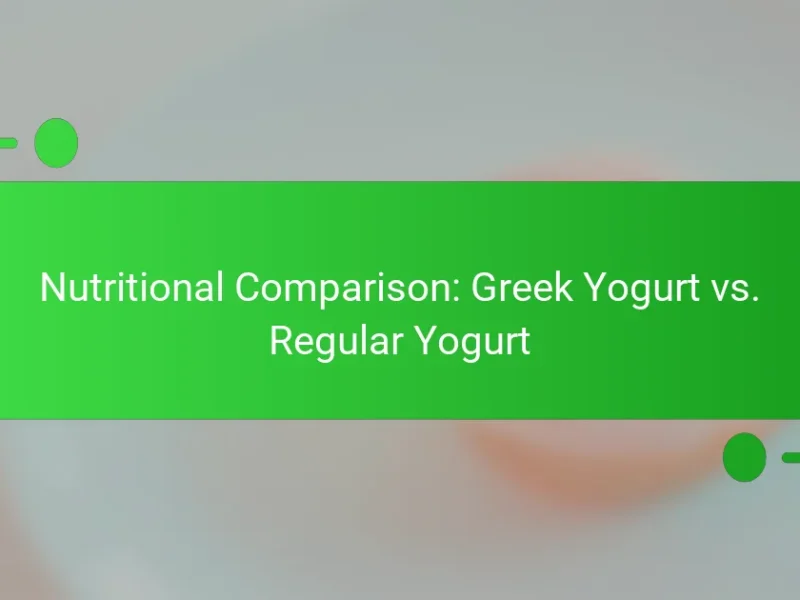Greek yogurt is a high-protein dairy product that plays a significant role in weight management. With protein levels reaching up to 20 grams per serving, it promotes feelings of fullness and helps control appetite, making it an effective choice for those looking to lose or maintain weight. Research indicates that individuals who incorporate Greek yogurt into their diets often experience lower body weight and fat. Additionally, its low-calorie content compared to other snacks further supports its benefits in weight loss efforts, as highlighted by studies published in reputable nutrition journals. This article will explore the myths and facts surrounding the impact of Greek yogurt on weight management.

What is the impact of Greek yogurt on weight management?
Greek yogurt aids in weight management by promoting satiety and providing high protein content. Its protein content can be up to 20 grams per serving. This high protein level helps reduce hunger and control appetite. Studies indicate that individuals consuming Greek yogurt tend to have lower body weight and fat. A study published in the American Journal of Clinical Nutrition found that high-protein dairy products can enhance weight loss efforts. Additionally, Greek yogurt is low in calories compared to other snacks. This makes it a beneficial choice for those aiming to lose weight or maintain a healthy weight.
How does Greek yogurt contribute to weight loss?
Greek yogurt contributes to weight loss by being high in protein and low in calories. This combination helps increase feelings of fullness. Studies show that higher protein intake can reduce overall calorie consumption. Greek yogurt typically contains about 10 grams of protein per serving. This protein content supports muscle maintenance during weight loss. Additionally, it has probiotics that may aid digestion and gut health. Improved gut health can influence weight management positively. Overall, Greek yogurt can be a beneficial food choice for weight loss diets.
What specific nutrients in Greek yogurt aid in weight management?
Greek yogurt contains several nutrients that aid in weight management. High protein content is one of the main nutrients. Protein promotes satiety, helping to reduce overall calorie intake. Greek yogurt typically has about 10 grams of protein per serving. This high protein content can help maintain muscle mass during weight loss.
Additionally, Greek yogurt is rich in calcium. Calcium plays a role in fat metabolism and may help regulate body weight. Some studies suggest that adequate calcium intake can support weight loss efforts. Greek yogurt also contains probiotics, which can improve gut health. A healthy gut microbiome is linked to better weight management.
Moreover, Greek yogurt is lower in sugar compared to regular yogurt. Lower sugar content helps to avoid excess calorie consumption. These combined nutrients make Greek yogurt a beneficial option for those seeking to manage their weight.
How does the protein content in Greek yogurt affect satiety?
The protein content in Greek yogurt significantly enhances satiety. Higher protein levels stimulate the release of hormones that promote feelings of fullness. Studies show that protein-rich foods can reduce hunger and increase the feeling of fullness compared to lower protein options. Greek yogurt typically contains about 10 grams of protein per 100 grams. This amount is higher than regular yogurt, contributing to its effectiveness in curbing appetite. Research indicates that consuming protein can lead to lower overall calorie intake throughout the day. Therefore, the protein content in Greek yogurt plays a crucial role in managing hunger and supporting weight management.
What are common myths surrounding Greek yogurt and weight management?
Greek yogurt is often misunderstood in the context of weight management. One common myth is that all Greek yogurt is low in calories. In reality, some varieties can be high in added sugars and fats. Another myth is that consuming Greek yogurt alone will lead to weight loss. Weight management requires a balanced diet and lifestyle, not just one food item. Additionally, many believe that Greek yogurt is always a good source of protein. While it generally has higher protein than regular yogurt, some brands may contain less protein due to processing. Lastly, there is a belief that Greek yogurt can replace all meals for weight loss. This is misleading, as it lacks essential nutrients when consumed in excess.
Is Greek yogurt a high-calorie food that hinders weight loss?
Greek yogurt is not inherently a high-calorie food that hinders weight loss. A typical serving of plain Greek yogurt contains about 100-150 calories. It is high in protein, which can promote satiety and help control appetite. Studies show that incorporating Greek yogurt into a balanced diet may support weight management. The protein content can increase feelings of fullness, reducing overall calorie intake. Additionally, Greek yogurt contains probiotics, which may benefit gut health and metabolism. Therefore, it can be included in a weight loss plan without hindering progress.
Does consuming Greek yogurt lead to weight gain?
Consuming Greek yogurt does not inherently lead to weight gain. Greek yogurt is a high-protein food that can promote satiety. It contains beneficial nutrients like calcium and probiotics. The key factor in weight management is overall caloric balance. If Greek yogurt is consumed within a balanced diet, it can support weight loss or maintenance. Research shows that high-protein diets can help reduce body fat. A study published in the American Journal of Clinical Nutrition found that protein-rich foods can enhance weight loss efforts. Therefore, Greek yogurt can be part of a healthy weight management strategy.
What scientific evidence supports the benefits of Greek yogurt for weight management?
Greek yogurt supports weight management through its high protein content and probiotic properties. Research indicates that high-protein diets can enhance satiety and reduce overall calorie intake. A study published in the “American Journal of Clinical Nutrition” by Soenen et al. found that increased protein intake leads to greater feelings of fullness. Additionally, Greek yogurt contains probiotics, which may improve gut health and influence weight regulation. A review in “Obesity Reviews” by Kverka et al. highlights the role of gut microbiota in weight management. These findings collectively support the benefits of Greek yogurt for weight management.
What studies demonstrate the effects of Greek yogurt on body composition?
Several studies demonstrate the effects of Greek yogurt on body composition. Research published in the “Journal of Nutrition” by P. J. H. van der Beek et al. found that Greek yogurt consumption is associated with reduced body fat. Another study in “Obesity” by D. A. Drenik et al. indicated that participants who included Greek yogurt in their diet experienced significant reductions in waist circumference. Additionally, a meta-analysis in “Nutrition Reviews” by H. M. H. So et al. concluded that dairy protein, including Greek yogurt, positively affects body composition by enhancing muscle mass and reducing fat mass. These studies collectively support the idea that Greek yogurt can be beneficial for improving body composition.
How does Greek yogurt compare to regular yogurt in weight management?
Greek yogurt is often more effective for weight management than regular yogurt. It contains higher protein content, which promotes satiety. A typical serving of Greek yogurt has about 15-20 grams of protein, compared to 9 grams in regular yogurt. This increased protein helps control hunger and reduce overall calorie intake. Additionally, Greek yogurt is lower in sugar, which can aid in weight loss efforts. Studies indicate that higher protein diets can lead to greater fat loss and muscle retention. Therefore, incorporating Greek yogurt into a balanced diet may support weight management goals more effectively than regular yogurt.
How can Greek yogurt be effectively incorporated into a weight management plan?
Greek yogurt can be effectively incorporated into a weight management plan by utilizing its high protein content and low calorie count. Consuming Greek yogurt as a breakfast option can promote satiety and reduce cravings throughout the day. It contains approximately 15-20 grams of protein per serving, which aids in muscle preservation during weight loss. Adding fruits or nuts to Greek yogurt can enhance its nutritional value while providing healthy fats and fiber. Research indicates that incorporating high-protein foods like Greek yogurt can lead to greater weight loss and improved body composition. A study published in the “American Journal of Clinical Nutrition” found that higher protein intake supports weight management efforts.
What are the best ways to include Greek yogurt in daily meals?
Include Greek yogurt in daily meals by using it in smoothies, salads, and as a topping. Greek yogurt adds creaminess and protein to smoothies. Blend it with fruits for a nutritious breakfast. Use Greek yogurt in salads as a dressing alternative. It enhances flavor while reducing calories. Serve Greek yogurt as a topping for baked dishes or chili. This adds richness and nutritional value. Incorporate it into breakfast by using it with granola or fruit. This combination provides a balanced meal. Greek yogurt can also be used in baking as a substitute for oil or butter. This reduces fat content while maintaining moisture.
What portion sizes of Greek yogurt are recommended for weight management?
A recommended portion size of Greek yogurt for weight management is typically 150 to 200 grams per serving. This size provides a balance of protein and calories. Consuming this amount can help maintain satiety and support muscle health. Studies suggest that high-protein diets can aid in weight loss and management. Greek yogurt is also lower in sugar compared to regular yogurt, making it a healthier choice. Incorporating it in moderation can enhance overall dietary quality.
What are practical tips for choosing the right Greek yogurt for weight management?
Choose Greek yogurt with low fat or non-fat content for weight management. Low-fat options typically have fewer calories. Check the protein content; higher protein aids in satiety. Aim for at least 15 grams of protein per serving. Look for added sugars; select varieties with minimal or no added sugars. Reading labels is essential for understanding nutritional content. Choose plain Greek yogurt to avoid excess sugars. Consider portion sizes; moderation helps control calorie intake. Lastly, opt for brands with live active cultures for additional health benefits.
How can one identify healthy Greek yogurt options in stores?
To identify healthy Greek yogurt options in stores, check the ingredient list for minimal additives. Choose brands with live active cultures, as they offer probiotic benefits. Look for low sugar content, ideally less than 10 grams per serving. Select plain varieties to avoid added sugars and flavors. Opt for options with higher protein content, typically around 15-20 grams per serving. Check the fat content; non-fat or low-fat options are often healthier. Additionally, choose organic or grass-fed varieties for better nutrient profiles. These criteria help ensure that the Greek yogurt is nutritious and supportive of weight management.
What should consumers look for on Greek yogurt labels for weight management?
Consumers should look for low-fat or non-fat options on Greek yogurt labels for weight management. These varieties typically contain fewer calories and saturated fats. Additionally, consumers should check for high protein content, as protein can promote satiety. Aiming for at least 10 grams of protein per serving is beneficial. It’s also important to watch for added sugars, as excess sugar can hinder weight management efforts. Ideally, consumers should choose Greek yogurt with less than 5 grams of added sugar per serving. Lastly, looking for live and active cultures can indicate probiotic benefits, which may support digestive health and weight management.
The primary entity of this article is Greek yogurt, specifically its impact on weight management. The article explores how Greek yogurt, with its high protein content and low calorie count, aids in promoting satiety and reducing overall calorie intake, making it a beneficial choice for weight loss. It addresses common myths surrounding Greek yogurt, such as misconceptions about its calorie content and protein levels, while providing scientific evidence supporting its role in weight management. Additionally, practical tips for incorporating Greek yogurt into a diet and identifying healthy options in stores are discussed, emphasizing its nutritional benefits for those aiming to manage their weight effectively.


